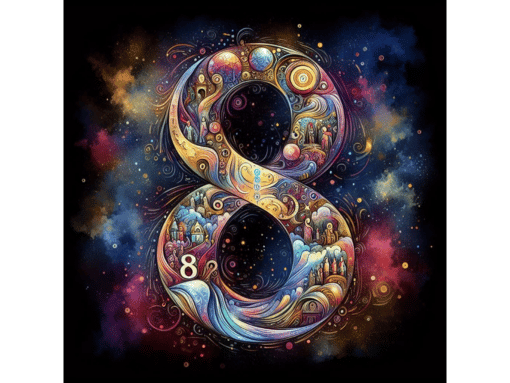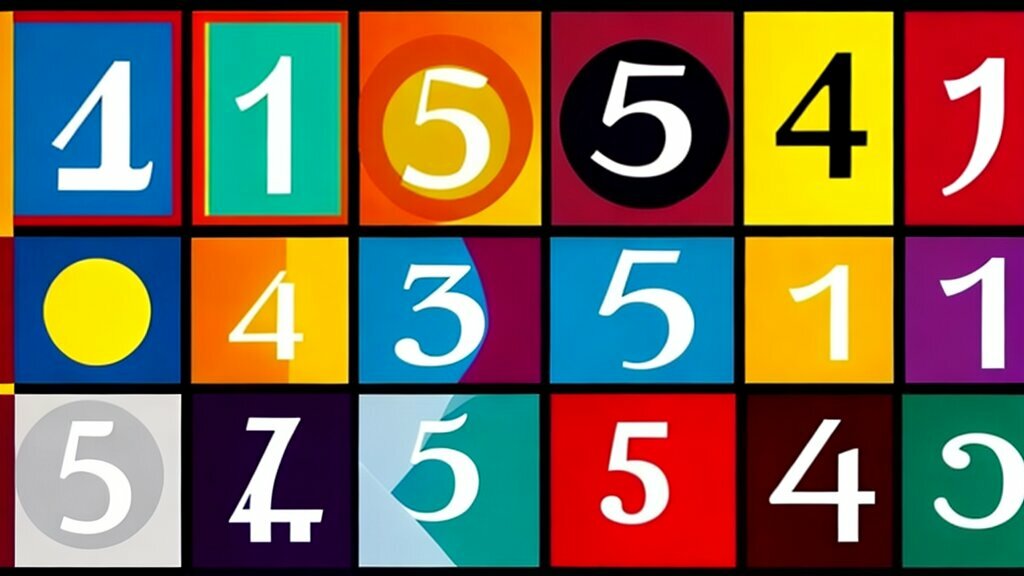The number eight resounds with renewal and rebirth in Scripture. On the eighth day, God created man, marking a new beginning. Eight souls were spared in Noah’s ark, saved to restore life after the flood. And Jesus rose on the eighth day, the first day of a new week, conquering death itself.
Time and again, this symbolic number signals fresh starts, new covenants, and the promise of eternity bursting into mortal reality. For believers, eight radically transcends the seven-day cycles we inhabit, lighting the way to resurrection and spiritual fulfillment.
Key Takeaways
- The number eight represents new beginnings and rebirth, as shown through God creating man on the eighth day and eight people restored through Noah’s ark after destruction.
- It signifies salvation, as depicted in eight souls spared to replenish life on earth after the flood.
- This symbolic number points to the eternal, transcending earthly cycles of seven to signal fresh starts and holy eternity.
- It embodies spiritual completion and renewal conveyed through key Christian rituals like baptism and festivals timed around the power of eight.
Biblical Symbolism of the Number 8

The number 8 holds a special symbolic significance in the Bible, representing new beginnings, rebirth, and resurrection. It is often used as a symbol of divine order and completion, emphasizing the spiritual completeness and fulfillment that comes with embracing God’s grace.
One of the most prominent examples of the use of the number 8 in biblical symbolism is the eighth day of creation, when God made Adam and Eve. This day represents new beginnings and the start of human life on earth.
Another notable example is the circumcision of Jesus on the eighth day, which symbolizes his entrance into a new covenant with God and the beginning of his mission on earth.
The story of Noah’s ark also highlights the significance of the number 8 in biblical symbolism. According to the Bible, only eight people – Noah, his wife, their three sons, and their wives – were saved from the flood that wiped out the rest of humanity.
The number 8 therefore represents salvation and the opportunity for a new beginning.
Biblical Symbolism of the Number 8 in Practice
Christians often incorporate the symbolism of the number 8 into their spiritual practices. For example, the Feast of Tabernacles – one of the most important Jewish holidays – is celebrated for seven days, followed by an eighth day of solemn assembly. This eighth day represents the spiritual completion of the feast and the beginning of a new year.
Similarly, baptism – which represents spiritual rebirth – is traditionally performed on the eighth day after a child’s birth. This practice is rooted in the symbolism of the number 8 as a representation of new beginnings and the start of a new life in Christ.
“The number 8 holds a special symbolic significance in the Bible, representing new beginnings, rebirth, and resurrection.”
Number 8 in the Old Testament

The number 8 holds a special place in the Old Testament, with specific references to its symbolic significance.
In Genesis, we see that God rested on the seventh day after completing his work of creation, and on the eighth day, he began a new creation. This theme of new beginnings is evident throughout the Old Testament.
In the book of Leviticus, we see the significance of the eighth day in the ritual of circumcision. Jewish male infants were circumcised on the eighth day as a symbol of their covenant with God.
In Deuteronomy, the Feast of Tabernacles is celebrated for seven days, followed by an eighth day of solemn assembly. This eighth day is a symbol of the eternal rest that awaits God’s chosen people.
The number 8 is also associated with purification. In Leviticus 14, we see that a leper who had been healed was to present himself to the priest on the eighth day for purification. This symbolized the leper’s complete healing and restoration to the community.
Overall, the number 8 in the Old Testament symbolizes new beginnings, covenant, and purification. It represents the completeness of God’s work and his promises to his people.
Number 8 in the New Testament
In the New Testament, the number 8 is closely associated with new beginnings and spiritual rebirth.
One of the most significant references to the number 8 in the New Testament is the resurrection of Jesus, which occurred on the eighth day (Sunday) following his crucifixion on Friday. This event symbolizes the ultimate new beginning and the triumph of life over death.
Another notable reference to the number 8 in the New Testament is the concept of baptism, which is often connected to the idea of spiritual rebirth.
In early Christianity, baptism was typically performed by immersion on the eighth day following a child’s birth. This practice symbolized the new life that the child was entering into as a member of the Christian community.
The Eighth Day

The idea of the eighth day as a symbol of new beginnings is also seen in the concept of the “Eighth Day of Assembly”. This refers to a Jewish festival that follows the seven-day Feast of Tabernacles. The eighth day is considered a separate holiday, and is often associated with the theme of new beginnings and spiritual renewal.
Additionally, the Book of Revelation mentions the number 8 in several passages, often in connection with the idea of new beginnings and eternal life. For example, Revelation 21:5 speaks of “making all things new,” while Revelation 22:13 describes God as “the Alpha and the Omega, the First and the Last, the Beginning and the End.”
The Spiritual Essence of the Number 8
According to biblical symbolism, the number 8 represents spiritual completion and fulfillment. It signifies the union of the divine and the human, as well as the fullness of God’s grace and blessings. In fact, the number 8 is often associated with the Holy Spirit, which is seen as the complete manifestation of God on earth.
Several Bible verses emphasize the spiritual significance of the number 8. For example, in Isaiah 11:2-3, the Spirit of the Lord is described as having seven attributes, which are then summed up by the eighth attribute: “the fear of the Lord”. Similarly, in Colossians 2:9-10, it is stated that in Christ “the whole fullness of deity dwells bodily,” and that we, as believers, “have been filled in him, who is the head of all rule and authority.”
Understanding the spiritual essence of the number 8 has helped me to appreciate the deeper meanings behind biblical concepts and teachings. It has also reminded me of the importance of seeking spiritual completeness and fulfillment in my daily life.
The Impact of the Number 8 on Christian Theology
As I’ve explored, the symbolic meaning of the number 8 runs deep in the Bible, and it has had a profound impact on Christian theology and spirituality.
One of the most significant ways the number 8 has influenced Christian beliefs and practices is through its association with new beginnings and spiritual rebirth.
This theme is central to Christian theology, as seen in the sacrament of baptism, which symbolizes one’s death to sin and new life in Christ.
Furthermore, the resurrection of Jesus on the eighth day (Sunday) is a powerful reminder of the hope and new life that Christians have in Christ. This event serves as a foundation for the Christian faith and is celebrated every year during the Easter season.
The Impact of the Number 8 on Baptism
Baptism, which symbolizes the washing away of sin and the beginning of a new life in Christ, holds significant meaning in Christian theology. The use of water in baptism is both a symbol of cleansing and new life, as well as a sign of the Holy Spirit’s work in the believer’s life.
Interestingly, the number 8 is associated with baptism in the Bible. In the New Testament, baptism is referred to as a “circumcision made without hands” (Colossians 2:11-12), which is performed on the eighth day after birth, just like circumcision in Jewish tradition.
Therefore, the number 8 is not only symbolic of new beginnings and spiritual rebirth but is also tied to the sacrament of baptism, further emphasizing its importance in Christian theology and practice.
The Impact of the Number 8 on Easter

Easter, which celebrates the resurrection of Jesus, is one of the most important events in the Christian calendar. The connection between Easter and the number 8 lies in the fact that Jesus rose from the dead on the eighth day, the first day of a new week (Sunday).
The resurrection of Jesus is a powerful demonstration of God’s love and power and serves as a source of hope for believers. In addition, the concept of new beginnings associated with the number 8 is reflected in Jesus’ resurrection, which represents a new creation and a new order.
Overall, the number 8 holds immense significance in Christian theology and spirituality, and understanding its symbolism can deepen one’s faith and appreciation of the Bible’s message.
Conclusion
The number 8 holds a special significance in biblical symbolism, representing new beginnings and spiritual fulfillment. Its association with divine order and completion sheds light on the deeper meanings behind biblical interpretation.
By exploring the significance of the number 8, we gain a deeper understanding of God’s plan for humanity and our own spiritual journey.
FAQs
What is the significance of the number 8 in Hebrew?
The number 8 in Hebrew is connected to concepts of new beginnings, renewal, and eternal existence beyond our natural world. It is one step above 7, which represents the completion of creation.
What does the number 8 represent?
The number 8 represents new beginnings, regeneration, eternity, infinity (symbolized by the infinity sign ∞), circumcision on the 8th day, and the 8 days of the Hanukkah festival.
What does 8 days mean in the Bible?
In the Bible, the story of Noah’s ark describes 8 people being saved from the Flood, representing salvation and a new beginning for humanity after destruction.
What is the spiritual meaning of the eighth month?
The eighth month in the Jewish calendar is Cheshvan. In Temple times it was the month when special offerings were made seeking guidance and inspiration at the start of the rainy season in Israel. The number 8 is also connected to revelations and enlightenment in Jewish mysticism.
Is 8 a holy number?
8 is considered a holy number in Judaism and the Bible:
- Eight symbolizes going beyond the natural world, which was created in 7 days. So 8 represents the supernatural or holiness.
- Jewish baby boys are circumcised and formally named on the 8th day after birth, recognizing their holy covenant with God.
- There are 8 days for key festivals like Passover and Sukkot, going beyond the standard 7-day week.
- The Temple menorah has 8 branches. The Temple represents the holy presence of God.
- In Christianity, Jesus rose from the dead on “the eighth day” after Passover, demonstrating his divinity and holiness.
- In Revelation, Jesus is called the Eighth and belongs to the realm of holy eternity.
So across Jewish and Christian scripture, 8 is tied to holiness, the heavens, eternity, resurrection, and life beyond the mundane world. The number 7 encompasses creation, while 8 transcends it through the holy power of God. That’s why 8 is considered a holy number.






